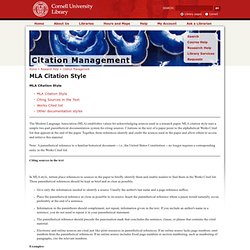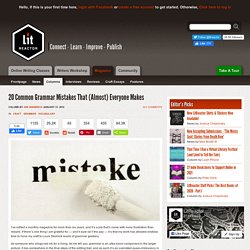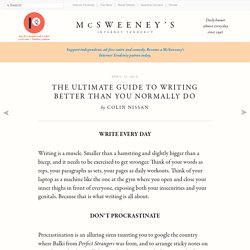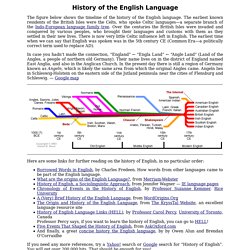

Cornell University Library. MLA Citation Style The Modern Language Association (MLA) establishes values for acknowledging sources used in a research paper.

MLA citation style uses a simple two-part parenthetical documentation system for citing sources: Citations in the text of a paper point to the alphabetical Works Cited list that appears at the end of the paper. Together, these references identify and credit the sources used in the paper and allow others to access and retrieve this material.
Note: A parenthetical reference to a familiar historical document -- i.e., the United States Constitution -- no longer requires a corresponding entry in the Works Cited list. Citing sources in the text In MLA style, writers place references to sources in the paper to briefly identify them and enable readers to find them in the Works Cited list. Give only the information needed to identify a source. Examples: For more detailed information about citing references in the text, please refer to the MLA resources listed below. Examples. 20 Common Grammar Mistakes That (Almost) Everyone Makes. I’ve edited a monthly magazine for more than six years, and it’s a job that’s come with more frustration than reward.

If there’s one thing I am grateful for — and it sure isn’t the pay — it’s that my work has allowed endless time to hone my craft to Louis Skolnick levels of grammar geekery. As someone who slings red ink for a living, let me tell you: grammar is an ultra-micro component in the larger picture; it lies somewhere in the final steps of the editing trail; and as such it’s an overrated quasi-irrelevancy in the creative process, perpetuated into importance primarily by bitter nerds who accumulate tweed jackets and crippling inferiority complexes. But experience has also taught me that readers, for better or worse, will approach your work with a jaundiced eye and an itch to judge. While your grammar shouldn’t be a reflection of your creative powers or writing abilities, let’s face it — it usually is. Who and Whom This one opens a big can of worms.
Which and That Lay and Lie Moot Nor. The Ultimate Guide to Writing Better Than You Normally Do. Writing is a muscle.

Smaller than a hamstring and slightly bigger than a bicep, and it needs to be exercised to get stronger. Think of your words as reps, your paragraphs as sets, your pages as daily workouts. Think of your laptop as a machine like the one at the gym where you open and close your inner thighs in front of everyone, exposing both your insecurities and your genitals. Because that is what writing is all about. Procrastination is an alluring siren taunting you to google the country where Balki from Perfect Strangers was from, and to arrange sticky notes on your dog in the shape of hilarious dog shorts. The blank white page. Mark Twain once said, “Show, don’t tell.” Finding a really good muse these days isn’t easy, so plan on going through quite a few before landing on a winner.
There are two things more difficult than writing. It’s no secret that great writers are great readers, and that if you can’t read, your writing will often suffer. History of English. The figure below shows the timeline of the history of the English language.

The earliest known residents of the British Isles were the Celts, who spoke Celtic languages—a separate branch of the Indo-European language family tree. Over the centuries the British Isles were invaded and conquered by various peoples, who brought their languages and customs with them as they settled in their new lives. There is now very little Celtic influence left in English. The earliest time when we can say that English was spoken was in the 5th century CE (Common Era—a politically correct term used to replace AD).
In case you hadn’t made the connection, “England” ← “Engla Land” ← “Angle Land” (Land of the Angles, a people of northern old Germany). Here are some links for further reading on the history of English, in no particular order: If you need any more references, try a Yahoo! Copyright © 2003–2007 Daniel M.